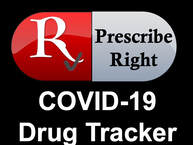|
COVID-19 Vaccines
On 3/24/2021, AstraZeneca announced that in a 32,449 patient, Phase III, BARDA sponsored U.S. trial (NCT04516746), two doses of AstraZeneca’s COVID-19 vaccine, given 4-weeks apart, had efficacy of 76% with 100% efficacy at preventing severe disease and hospitalizations. Efficacy was calculated after the development of 190 cases of COVID-19. Vaccine efficacy was consistent across ethnicity and age. 20% of patients were older than 65 years and efficacy was 85% for these patients. In the trial 79% of patients were white, 8% black, 4% native American, 4% Asian, and 22% Hispanic. Almost 60% had risk factors for progression to severe COVID-19.
Some countries have expressed concern for an increased risk for thromboembolic events with the AstraZeneca COVID-19 vaccine.
Researchers tested serum samples from 20 acutely ill COVID-19 patients, 20 recovered patients and 14 patients that had received the Moderna COVID-19 vaccine. All samples demonstrated an ability to neutralize the B.1.1.7 (British) variant. A preprint draft of a study examining data from 84 pregnant, 31 lactating, and 16 non-pregnant patients found the vaccine response was equivalent for pregnant and lactating women compared to non-pregnant women. Further the immune transfer to neonates occurred via placental and breastmilk. Three letters to the editor were published in the New England Journal of Medicine describing the effectiveness of the COVID-19 mRNA vaccines in healthcare settings.
COVID-19 Antibodies The FDA revised the health care provider fact sheets to include information on SARS-CoV-2 variants susceptibility to the Lilly and Regeneron monoclonal antibodies that have an Emergency Use Authorization for COVID-19. The fact sheets include information on susceptibilities and potential resistance that may decrease the effectiveness of the antibodies. The U.S. government will stop distributing bamlanivimab as a single antibody therapy for COVID-19 due to resistance by COVID-19 variants. The combination of bamlanivimab and etesevimab will continue to be distributed because the combination has retained activity against these variants. Healthcare sites with supplies of bamlanivimab can order etesevimab alone to pair with bamlanivimab. Regeneron announced that in a 29-day, 4,567 patient, Phase III trial (NCT04425629), 1% of patients treated with 1,200mg of the combination of casirivimab with imdevimab progressed to hospitalization or death compared to 3.2% with placebo in high-risk COVID-19 outpatients. Treatment with 2,400 mg of the monoclonal combination resulted in 1.3% of patients progressing to hospitalization or death compared to 4.6% with placebo COVID-19 Anti-Inflammatories In a retrospective review of data from 412 hospitalized patients with COVID-19, 36% of patients receiving aspirin progressed to mechanical ventilation compared to 48% that did not receive aspirin. A multivariable adjustment found a 44% reduced risk for mechanical ventilation with aspirin without an increased risk for major bleeding. In a 14-day, 39 patient, Phase II trial (NCT04399980, NCT04463004, and NCT04492514), treatment with mavrilimumab (n=21) did not decrease morbidity or the need for supplemental oxygen compared to placebo (n=19) in non-ventilated hospitalized COVID-19 patients with hypoxemia, and a C-reactive protein concentration of 5 mg/dL or greater. COVID-19 Antivirals In a retrospective review of 2,483 consecutive patients with severe COVID-19, 342 patients received remdesivir with 184 also receiving corticosteroids. Treatment with remdesivir resulted in a decrease in time to clinical improvement (5 vs 7 days). Mortality had a non-significant decrease (7.7% vs 14%), which was not affected by use of corticosteroids. The patient population was 80% non-white, compared to 30% to 47% in clinical trials. Comments are closed.
|
Stay informed, subscribe to the Prescribe Right Pharmaceutical Pipeline Tracker
Archives
January 2023
Categories |
Services |
Company |
Support |
© COPYRIGHT 2015. ALL RIGHTS RESERVED.
|


 RSS Feed
RSS Feed